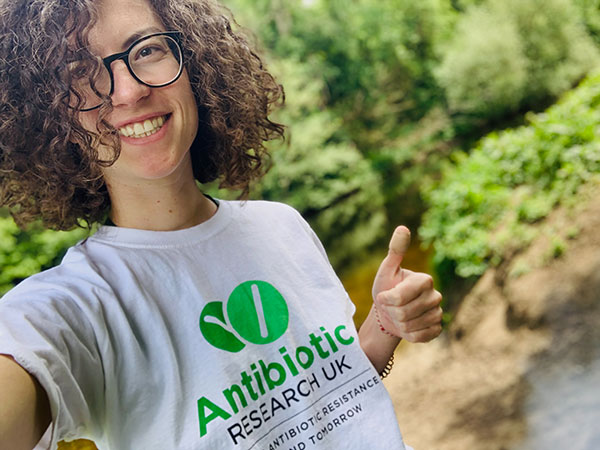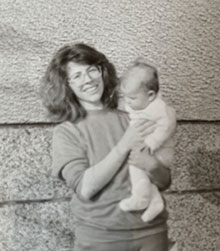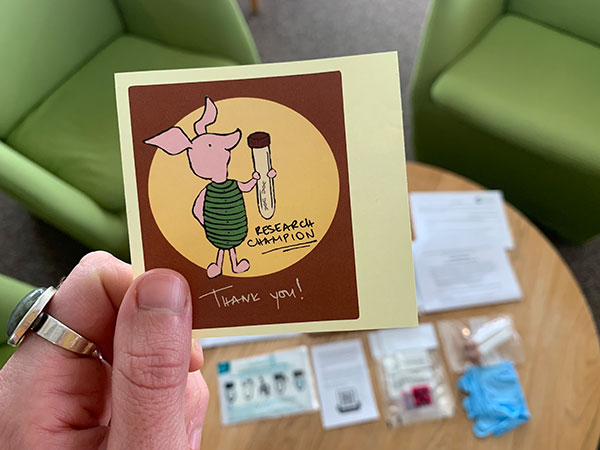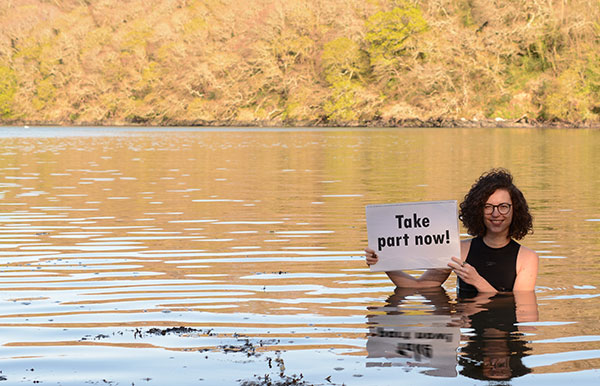
Sampling water from the River Dart is one of my favourite parts of this research project, especially on a sunny day!

Photo of me in my mother’s arms, taken just a month before she developed tuberculosis. Without effective antibiotics, her recovery might not have been possible.
Studying antimicrobial resistant bacteria in freshwater environments: meet Elitsa Penkova
THE RESEARCH
My research focuses on understanding the public health risks from antimicrobial resistant bacteria –in rivers and other freshwater environments. Bacteria are single-celled microorganisms found almost everywhere on Earth, from the depths of the ocean to the inside of our bodies. Many bacteria are beneficial. For example, some bacteria help us digest food, or protect us against harmful invaders. Other bacteria can cause infection and diseases. These are called pathogens. When I talk about antibiotic-resistant bacteria, I am specifically referring to pathogens who are no longer responding to antibiotic treatment. Human pathogens, including antibiotic-resistant pathogens, enter the aquatic environment through our wastewater system. Alongside bacteria, wastewater also brings residue levels of antibiotics which are excreted through our urine and faeces. Excreted antibiotics are typically not sufficient to kill bacteria, nevertheless, they create favourable conditions for resistant pathogens, thereby promoting their survival and spread in these natural environments.
As a scientist, As a scientist, I want to understand how freshwater swimmers in the UK might get a particular type of antibiotic-resistant Escherichia coli (E. coli) bacteria in their guts. These bacteria can reside in our gut as part of our “gut microbiome” – the collection of microbes that form a complex community which works together with our body to break down food, extract nutrients and contribute to our overall health - without necessarily leading to ill health symptoms. This generally means that individuals with robust immune systems may not necessarily experience any consequences of having these bacteria in their gut. The concern, however, is that these bacteria spread easily from human-to-human and people who have less robust immune systems can be at risk of developing an infection with limited treatment options. This means that understanding of how freshwater environments might spread antibiotic-resistant bacteria to the public is critical. To do my work, over the course of this summer I am inviting both river swimmers and non-swimmers to send over their faecal samples to our lab for analysis. We called this …the Poo-Sticks Study, get it?

When putting the poo-collection kits together, I wanted to add my personal touch and a splash of colour to the otherwise sterile, grey appearance. So, I designed this sticker to include in the kit as a way to say thank you and to remind people that there’s room for humour and colour in science!
Secondly, I want to know how likely river swimmers are to experience poor health symptoms. Typical symptoms associated with swimming include stomach complaints, skin conditions, ear and eye complaints. These illnesses are often mild and typically do not require treatment. This means that these complaints tend to be under-reported. In addition, the risks of experiencing these conditions have not been assessed for freshwater swimmers in the UK. While the media reports of people falling ill after a swim, the evidence of the water being the cause is not clear. By comparing the rates of illness between swimmers and non-swimmers, we might be able to get a clearer picture of what the effect water pollution has on swimmers’ health. To do this, I have launched the National Health Snapshot - a simple online questionnaire designed to understand if people who swim in rivers or lakes are more likely to experience health issues, compared to people who do not go into the water. I will continue to collect data throughout the summer of 2024, so please, do consider taking part, whether you are a river swimmer, or not!

WHY I DO WHAT I DO
I got involved in antimicrobial- (or specifically antibiotic-) resistance research in 2016, and have since completed four projects on the topic. Having effective antibiotics is so important. While we might not need them today or tomorrow, chances are that at some point in our lives, we will. When that time comes, my hope is that antibiotics will still be able to clear the bacterial infections we face.
Antibiotics are the reason I got to grow up with a mum. Sleep deprivation and poor nutrition while caring for two children under three had weakened my mum’s immune system, allowing bacteria that had been hiding in her body for years, the opportunity to strike. At the age of 27, my mum developed Tuberculosis (TB), a disease we rarely think of today. Yet, even now, a quarter of the world’s population carries latent TB-causing bacteria – this means that bacteria can remain in a state where they are not growing or causing illness – essentially ‘asleep’. And although only about 11% of these individuals will develop TB, each year approximately 450 000 new cases of TB (worldwide) are reported that do not respond to antibiotic treatment.
My mum, however, was lucky. She was able to take an antibiotic called rifampicin for six months – a potent antibiotic with unpleasant side effects – but I got to grow up with a mum. And I want to do what I can, to ensure that antibiotics continue to work when we need them most.
HOW IT ALL CAME TOGETHER
I never meant to become a scientist. When I was a kid I seemed to only focus on what I found interesting – I could spend hours learning about the origin of life and animals, but memorising the parts of the human eye was the hardest thing in the world. Some teachers thought I was bright, others were confident I had no potential. I believed them either way. After all, they were the experts. I didn’t exactly struggle at school, as overall I averaged ok, but science was not an option I considered possible – it would always be my hobby.
I sometimes think of a biology teacher, who let me pass her class out of kindness. Would she be surprised to learn I am now working on my third Bioscience degree, and even received an award for outstanding academic achievements? Would she re-think her approach to supporting her students’ learning needs?
There are two people who have been instrumental in my journey into science. My mum, who never took my teachers’ opinions seriously and gave me the final push to return to academia after nearly a decade of doubting my competence. The other was Prof. Ben Raymond at the University of Exeter, who took a chance with me and whose unwavering confidence in my abilities was the external validation I didn’t know I needed.
Laszlo Polgar, the education psychologist who wrote a manual on how to raise a genius, argued that geniuses are not ‘miracles’ but rather individuals who were able to learn what they were capable of, emphasising the importance of nurturing students’ self-confidence and curiosity. While I certainly don’t consider myself a genius, the optimism and support I have received since returning to academia has given me the courage to continue stretching the boundaries of my capabilities just a bit further.
